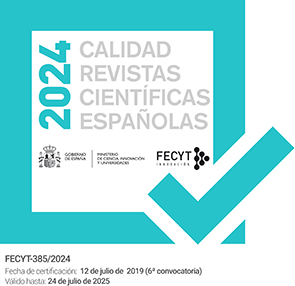Préservation
L'Editorial Universidad de Sevilla publie toutes ses revues en libre accès (OA). Tous les contenus sont distribués sous licence CC-BY-NC-SA, vous pouvez consulter le texte légal de la licence ici.
Les revues sous la supervision de l'Editorial Universidad de Sevilla, hébergées dans les domaines https://editorial.us.es/es/revistas et https://revistascientificas.us.es, bénéficient d'un archivage sécurisé et permanent grâce à la sauvegarde automatique de leur contenu toutes les 24 heures par le service informatique de l'université.
Tous les articles publiés dans les revues de l'EUS sont déposés dans le dépôt institutionnel IdUS, dont la politique de conservation est garantie :
- Le contenu sera vérifié régulièrement afin de préserver son intégrité, sa sécurité et sa durabilité.
- Le contenu sera transformé dans de nouveaux formats lorsque cela sera jugé nécessaire (sur la base des mêmes critères de sécurité et de durabilité).
- Des émulations logicielles seront fournies, dans la mesure du possible, pour l'accès aux formats qui ne peuvent être migrés.
- Des sauvegardes régulières sont effectuées sur l'ensemble du contenu idUS, y compris les données et les métadonnées.
Réseau de préservation PKP
Nos revues sont soutenues par PKP et son réseau de préservation PKP (PKP PN), qui permet aux revues d'être préservées numériquement dans OJS. Le programme LOCKSS offre une préservation décentralisée et distribuée, un accès perpétuel sans interruption et la préservation de la version originale authentique du contenu. PKP PN garantit que les revues qui ne font partie d'aucun autre service de conservation numérique (comme CLOCKSS ou Portico) peuvent être conservées pour un accès à long terme. Pour plus de détails sur PKP PN, voir la vue d'ensemble.
PN est un système de libre accès pour toutes les revues de l'OJS. Il est particulièrement intéressant pour les revues qui n'ont pas les ressources nécessaires pour faire partie d'un service de conservation en échange d'un avantage financier. Il est également intéressant pour les revues qui accordent une valeur supplémentaire au « libre accès ». Le réseau de préservation PKP est sécurisé et géré par PKP (une organisation à but non lucratif), à l'aide d'une infrastructure à source ouverte (LOCKSS), et accueille non seulement de nouvelles revues, mais aussi de nouveaux partenaires de stockage et collaborateurs.




